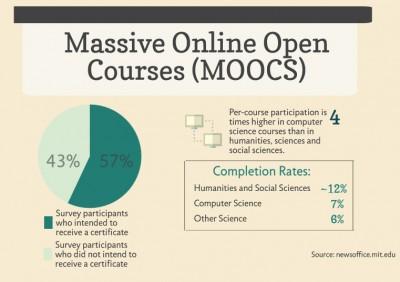
A Wednesday joint study by the Massachusetts Institute of Technology and Harvard University examined the use and demographic trends of Massive Online Open Course users, according to a Wednesday press release from MIT.
The report examined MOOC use from the fall of 2012 to the summer of 2014 through the edX platform at MIT and Harvard and found that the courses are popular among teachers and have seen more registration from women and older people.
“While many MOOC creators and providers have increased access to learning opportunities, those who are accessing MOOCs are disproportionately those who already have college and graduate degrees,” the release stated. “The researchers do not necessarily see this as a problem … However, to serve underrepresented and traditionally underserved groups, data suggest that proactive strategies may be necessary.”
Chris Dellarocas, the director of Boston University’s Digital Learning Initiative, said the demographics of MOOC users at BU reflect the findings found in MIT and Harvard’s study.
“In common with what MIT and Harvard has found, we also have found that the majority of our registrants in most of the courses are people who already have bachelor’s degrees,” he said. “Just to give you a sense, almost 80 percent of registrants in our Sabermetrics MOOC have a bachelor’s [degree] and above.”
The DLI has offered six MOOCs on the edX platform in the past two years, Dellarocas said. Nearly 75,000 participants from 154 of the world’s 196 countries have registered for the courses, according to an informational PowerPoint by the DLI.
The majority of registrants for BU MOOCs are male, according to the PowerPoint. The only open online course with a female majority is The Art of Poetry, which has a 55 percent female majority with 15,482 registered users.
Despite low number of students who receive a certificate of completion for the courses, the overall rate of completion has increased, Dellarocas said.
“Let’s say our first course had a 6.6 percent completion rate, [but] now we’re looking at about a 16.2 percent completion rate in our poetry MOOC,” he said. “In that sense, our courses have been successful.”
Dellarocas said it is not certain whether BU will expand its MOOC program because there is no financial advantage to offering the free online courses.
“They [the courses] definitely play a positive and transformative role for us,” he said. “A sustainability model has not yet emerged … Our intention is to keep producing them as long as we can find interesting, exciting topics that showcase the best that BU has to offer the world. We’ll continue at the same pace as we have been producing for the last couple of years.”
Several students expressed varying beliefs about MOOCs and their effectiveness.
Will Norman, a freshman in the College of Engineering, said although he hasn’t taken a MOOC, he understands the role online courses play in expanding educational opportunities.
“The use of technology will also increase in classes, especially for people living in remote areas or who have other priorities,” he said. “It’s important for people to have access to an education.”
Hyun Seung Cho, a freshman in the Questrom School of Business, said online courses can be valuable, but they don’t offer the same experience of learning in a traditional classroom setting.
“I don’t think online classes will affect our society that much because even though they’re popular, people are always going to go to university in order to get that respected degree,” he said. “It might make the job market slightly more competitive if more people have access to certain classes, but it won’t replace what people get out of university.”
Andy Sloan, a junior in the College of Communication, said he appreciates how BU is working to expand educational opportunities to those who do not attend the school.
“It’s awesome that they can reach out to people all around the world,” he said. “It’s perfect for what BU stands for.”

















































































































